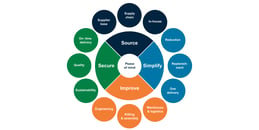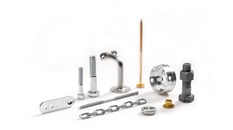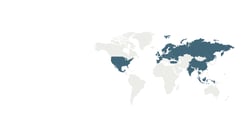- Insights
- The Solutionists Hub
- CBAM: How will it affect European manufacturers?
CBAM: How will it affect European manufacturers?

We all know that reducing the worst effects of climate change requires global solutions. However, as markets like the EU raise their climate ambitions and introduce new regulations and tariffs, there’s a growing risk of ‘carbon leakage’ – the phenomenon of EU companies moving their carbon-intensive production to countries with fewer climate regulations, or replacing European products with cheaper, more carbon-intensive imports.
The EU’s solution to carbon leakage is the Carbon Border Adjustment Mechanism (CBAM). It’s a framework that imposes tariffs on carbon-intensive goods manufactured outside the EU and aims to create a level playing field for European businesses by reducing the competition they face from foreign actors.
By making companies pay for the embedded emissions in their imported goods, CBAM encourages sustainable production in non-EU countries, makes the carbon price of imports equivalent to EU-produced goods, and prevents the undermining of EU environmental regulations.
Right now, European manufacturers need to know about the CBAM reporting requirements and understand the extra administration and level of supply chain knowledge they require. Companies that lack information on embedded emissions will soon have to pay a preset tariff for their imported goods – so the financial costs of poor preparation will be steep.
CBAM is still very new, so manufacturers will have to assess the impact and adapt over the coming years. Now, all European companies should know the answers to the following questions.
What goods are within the scope of CBAM and who is affected?
CBAM applies only to carbon-intensive goods that have a significant risk of carbon leakage. At the moment, the affected goods are cement, iron and steel, aluminium, fertilisers, electricity and hydrogen. CBAM applies to any company that imports these goods from outside the EU. It’s important for manufacturing companies to know that steel fasteners are within the scope of CBAM.
What about CBAM reporting?
CBAM came into effect on 1 October 2023, with a transitional phase where affected EU importers will have to report the embedded emissions or their imported goods each quarter. Only yearly reports will be needed once the transition phase ends at the start of 2026.
What about supply chain information?
Each company importing CBAM-affected goods must submit a CBAM report containing information on the quantity of imported goods, the direct and indirect emissions and the carbon price due in the country of production.
Are there any cost risks related to CBAM?
There will be soon. From January 2026, importers will have to start purchasing CBAM certificates for their non-EU imports – a kind of carbon credit that will bring the price of the imported carbon-intensive goods closer to the equivalent price of EU-produced goods. The price of the certificates will be based on the weekly average auction price of EU ETS allowances, expressed in tonnes of emitted CO2.
A preset tariff will be applied to companies that don’t know the embedded emissions of their imported goods, which will be based on the average emissions of the worst-performing producers of CBAM goods in the EU. So failing to gather information and managing carbon impacts in the supply chain can lead to painful financial costs for importers.
How does Bufab provide peace of mind?
- We are monitoring the regulatory context and taking care of reporting for imported products affected by CBAM.
- Our supplier engagement program targets suppliers with decarbonization activities at suppliers, leading to reduced carbon emissions and carbon-related costs.
- We collect the required information for CBAM registration from our supply chain partners – avoiding the threat of inflated preset tariffs and gathering better data to inform our decision making.
Learn more about CBAM and other sustainability factors that will impact your business in 2024 by reading our guide to sustainability in the C-parts supply chain or downloading the Manufacturer’s Guide to Sustainability Trends for free.
And make sure to get in touch if your company needs guidance in the new post-CBAM business landscape – our supply chain experts can help.
Get new knowledge every week!
Related
-
By Sergio BrambilaSustainability targets and KPIs to implement in the purchasing department
-
By Kadi MeriväljaC-Parts Purchasing: Handling Your Sustainable Purchasing Policy
-
By Patrik Lundström TörnquistSustainability Challenges With C-Parts, and How to Manage Them
-
By Carina LööfSustainable C-Parts: What You Need to Know
-
By Niklas LindsköldHuman rights due diligence: Is your supply chain under control?
-
By Niklas LindsköldChemical compliance: What manufacturing companies need to know
-
By Niklas LindsköldConflict minerals: How to avoid them in your manufacturing operation










